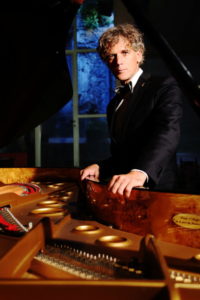SEBASTIANO BRUSCO (piano)
The Mozart Effect is a scientific theory developed by physicians  Gordon Shaw e Frances Rauscher in 1993. They determined that listening to Mozart’s music can induce a short-term improvement in the performance of mental tasks defined as spatial-temporal reasoning. Sebastiano Brusco’s research uses this premise to demonstrate how Mozart’s music has an enhanced effect on an audience.
Gordon Shaw e Frances Rauscher in 1993. They determined that listening to Mozart’s music can induce a short-term improvement in the performance of mental tasks defined as spatial-temporal reasoning. Sebastiano Brusco’s research uses this premise to demonstrate how Mozart’s music has an enhanced effect on an audience.
Brusco’s playing technique is characterized by authenticity and expressiveness prior to his arrival at the keyboard. This originates from an inner need to communicate the spirituality of music, rather than superficially spectacularize the performance.
In Mozart’s piano music, Brusco has found space for freeing the personality of the interpreter, often caged in rigid and unchallenged academic practices of execution. Such rigidity has transformed Mozart’s Sonatas, in the opinion of the public, into minor and frivolous pieces, closer to Rococo mannerism rather than to the Don Giovanni or the Requiem. Brusco has revealed that by employing a lower diapason tuning, instead of the one currently in use, he is able to enhance the directions of the harmonic paths that shape the Sonatas. He choose to employ the scientific tuning of 432 Hertz, which is thought to have been used by Mozart and used in the historical period in which the Sonatas were written, rather than today’s 440-442 Hz or higher.
Brusco’s interpretation is characterised by in-depth study and his research of refined authenticity and originality. He has built his personality by following and elaborating on the teaching of schools which use interpretative flexibility. He trained with the historical Italian piano schools of Arturo Benedetti Michelangeli (directly from his disciple Ennio Pastorino), Alfredo Casella (with the direct line of Lya de Barberiis) and Aldo Ciccolini, with whom he was a student for 8 years.
RÉCITAL SEBASTIANO BRUSCO (Piano)
Mozart
Sonata Kv 310
Allegro maestoso
Andante cantabile con espressione
Presto
Schubert
Impromtus op 90 n 2 Allegro
Impromtus op. 90 n. 3 Andante
Chopin
Etude op.25 n.1 (Aeolian harp)
Nocturne op.27 n.2
Ballade n.4 op.52
Nocturne op .9 n.2
Polonaise op.53 (heroique)
